NCERT Solutions for Class 7 Science Chapter 14 Electric Current and its Effects are part of NCERT Solutions for Class 7 Science. Here we have given NCERT Solutions for Class 7 Science Chapter 14 Electric Current and its Effects.
| Board | CBSE |
| Textbook | NCERT |
| Class | Class 7 |
| Subject | Science |
| Chapter | Chapter 14 |
| Chapter Name | Electric Current and its Effects |
| Number of Questions Solved | 13 |
| Category | NCERT Solutions |
NCERT Solutions for Class 7 Science Chapter 14 Electric Current and its Effects
Question 1.
Draw in your notebook the symbols to represent the following components of electrical circuits: connecting wires, switch in the ‘OFF’ position, bulb, cell, switch in the ‘ON’ position and battery.
Answer:


Question 2.
Draw the circuit diagram to represent the circuit shown in Fig.
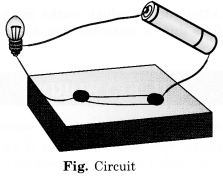
Answer:
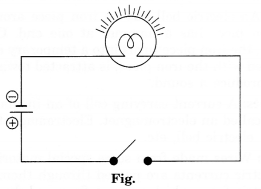
Question 3.
Figure shows four cells fixed on a board. Draw lines to indicate how you will connect their terminals with wires to make a battery of four cells.
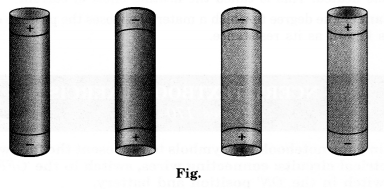
Answer:
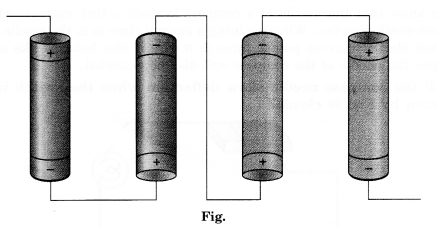
Question 4.
The bulb in the circuit shown in Fig. does not glow. Can you identify the problem? Make necessary changes in the circuit to make the bulb glow.
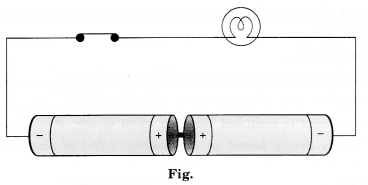
Answer:
The problem in this circuit is the connection of two cells. Here both the positive terminals of the cells are connected to each other. This must be reversed for anyone cell to make the bulb glow i.e., the positive terminal of one cell should be connected with the negative terminal of the other.
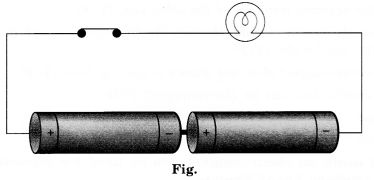
Question 5.
Name any two effects of electric current.
Answer:
- Heating effect.
- Magnetic effect.
Question 6.
When the current is switched on through a wire, a compass needle kept nearby gets deflected from its north-south position. Explain.
Answer:
When an electric current passes through a wire, it behaves like a magnet. This is the magnetic effect of the electric current due to the attraction of the wire. So, the compass needle which is a magnet gets deflected.
Question 7.
Will the compass needle show deflection when the switch in the circuit shown by Fig. is closed?
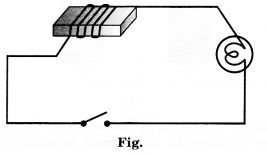
Answer:
No. Since, there is no cell so, no current will flow.
Question 8.
Fill in the blanks:
- A longer line in the symbol for a cell represents its ………… terminal.
- The combination of two or more cells is called a …………..
- When current is switched ‘on’ in a room heater, it ………….
- The safety device based on the heating effect of electric current is called a ……….
Answer:
- positive battery
- battery
- becomes red hot
- fuse
Question 9.
Mark ‘T’ if the statement is true and ‘F’ if it is false:
- To make a battery of two cells, the negative terminal of one cell is connected to the negative terminal of the other cell. (T/F)
- When the electric current, through the fuse exceeds a certain limit, the fuse wire melts and breaks. (T/F)
- An electromagnet does not attract a piece of iron. (T/F)
- An electric bell has an electromagnet. (T/F)
Answer:
- False
- True
- False
- True
Question 10.
Do you think an electromagnet can be used for separating plastic bags from a garbage heap? Explain.
Answer:
No. This is because electromagnets can only attract magnetic materials. The plastic bag is a non-magnetic material and will not be attracted by an electromagnet.
Question 11.
An electrician is carrying out some repairs in your house. He wants to replace a fuse with a piece of wire. Would you agree? Give reasons for your response.
Answer:
No, we would not agree to replace the fuse with a wire. The electric wire will not melt even if a high current flows through it. So, it will not prevent the damage done by high current.
Question 12.
Zubeda made an electric circuit using a cell holder shown in the following Fig., a switch, and a bulb. When she put the switch in the ‘ON’ position, the bulb did not glow. Help Zubeda in identifying the possible defects in the circuit.
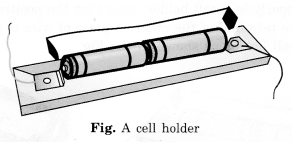
Answer:
One of the reasons may be that the rubber band used in the cell holder may not be tight enough to keep the two cells in contact with each other. If the cells are not in proper contact with each other, then the circuit will not be complete, and the current will not flow through the circuit. Hence, the bulb will not glow. The other reason may be that the two cells are not connected properly. The negative terminal of one cell must be connected to the positive terminal of the other cell.
Question 13.
In the circuit shown in the following Fig.:
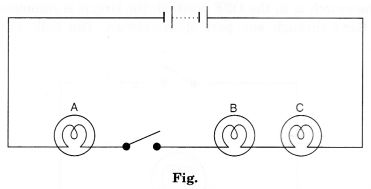
- Would any of the bulbs glow when the switch is in the ‘OFF’ position?
- What will be the order in which the bulbs A, B, and C will glow when the switch is moved to the ‘ON’ position?
Answer:
- No bulb will glow
- All bulbs will glow at a time.
We hope the NCERT Solutions for Class 7 Science Chapter 14 Electric Current and its Effects help you. If you have any query regarding NCERT Solutions for Class 7 Science Chapter 14 Electric Current and its Effects, drop a comment below and we will get back to you at the earliest.